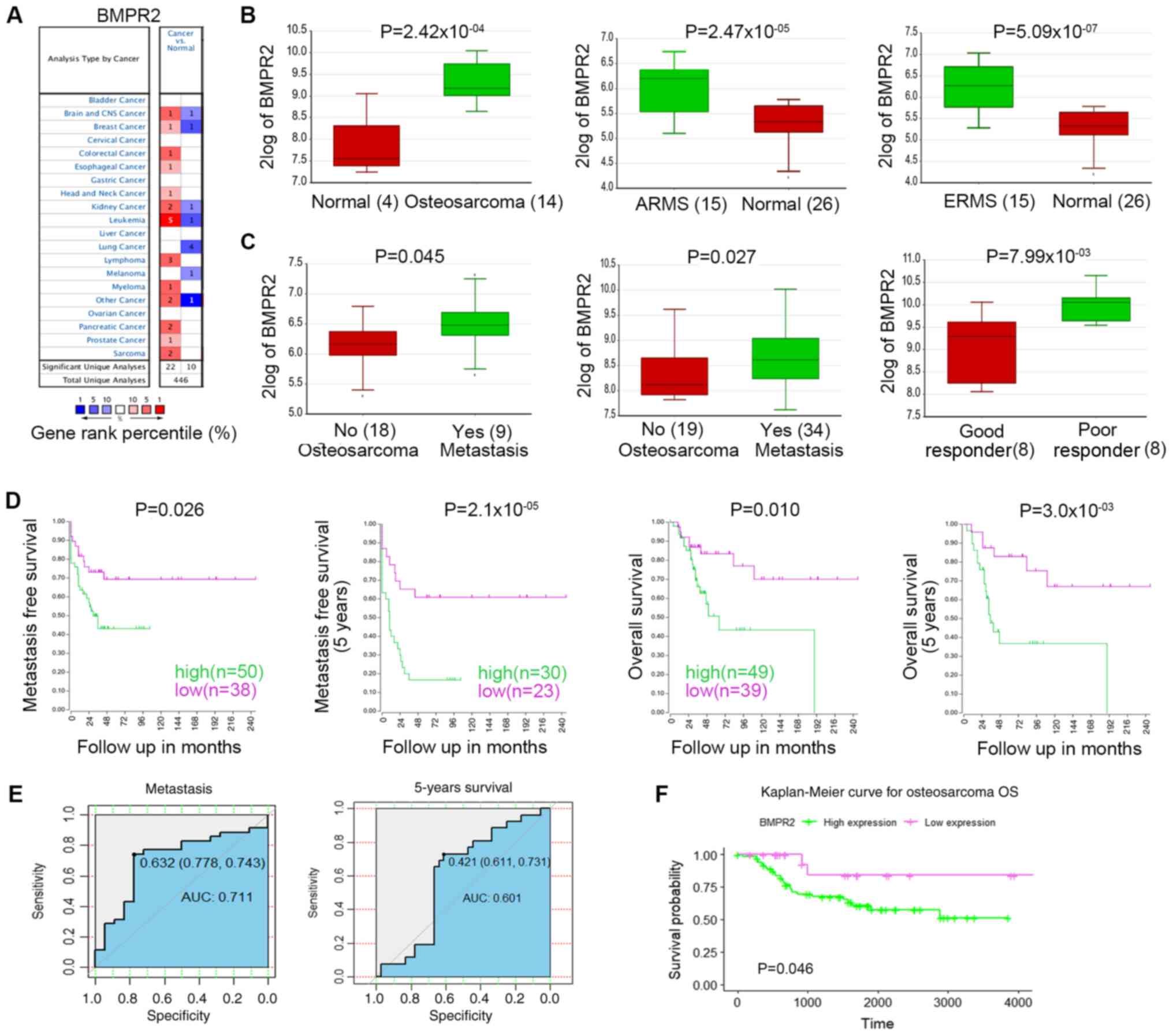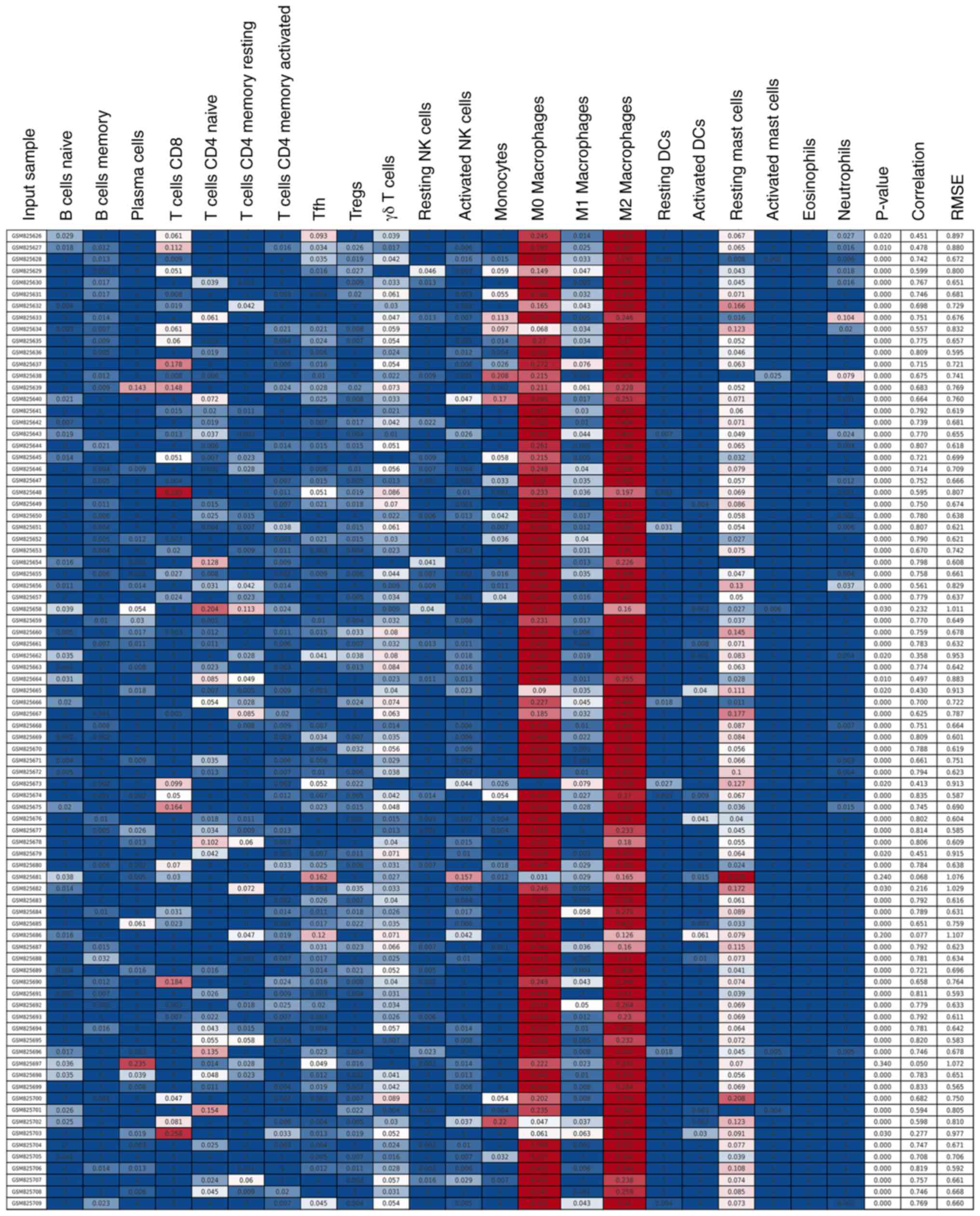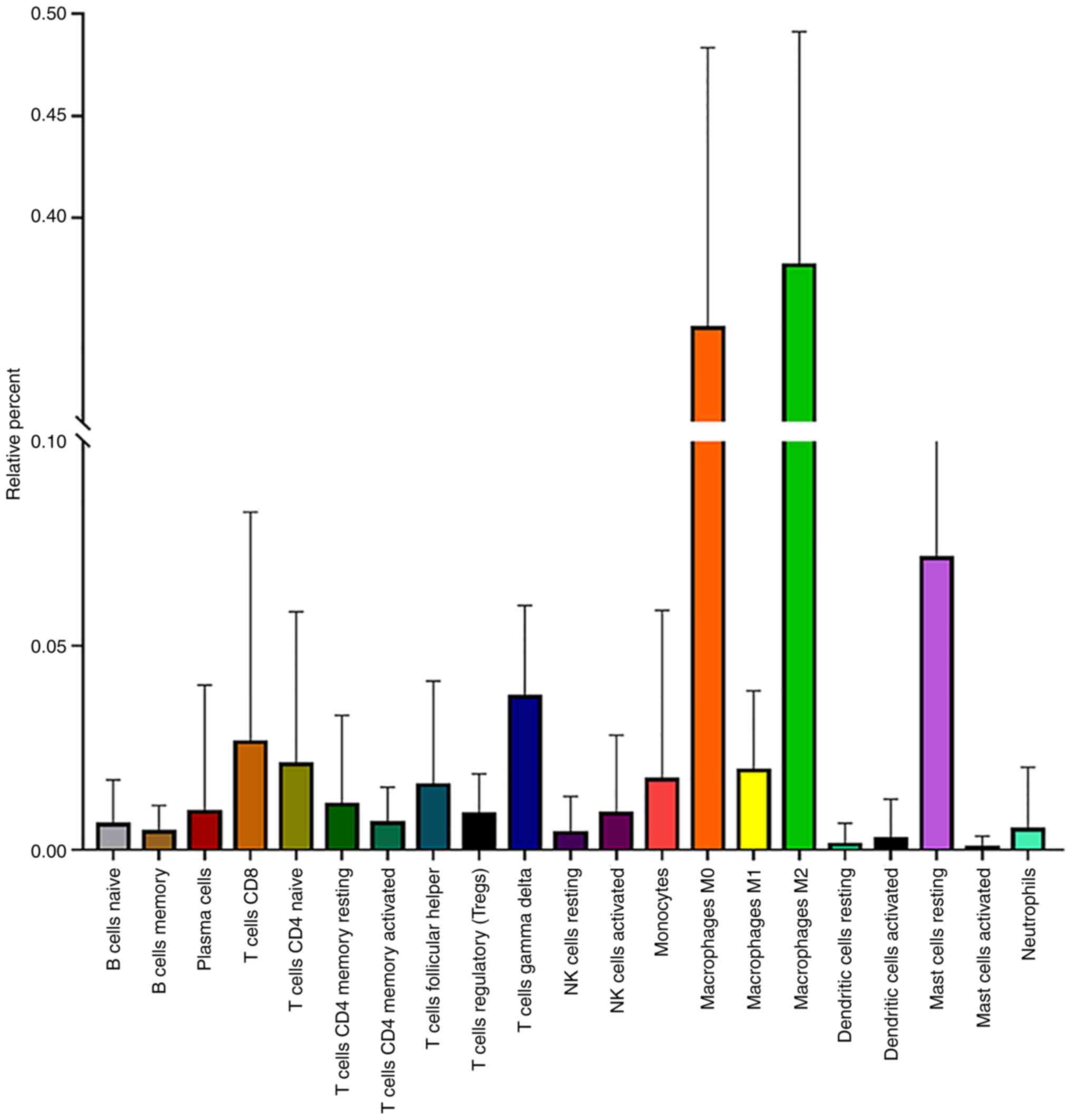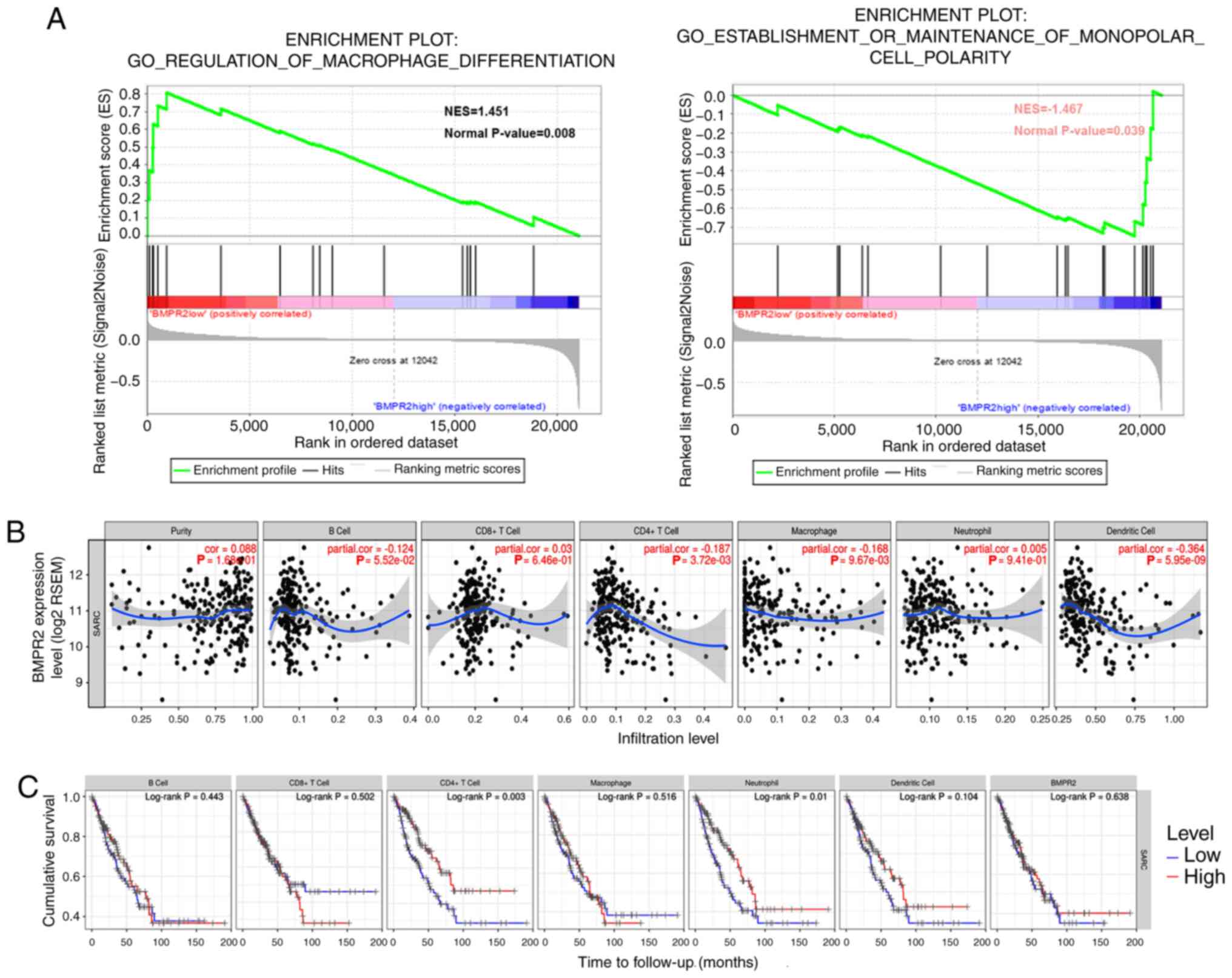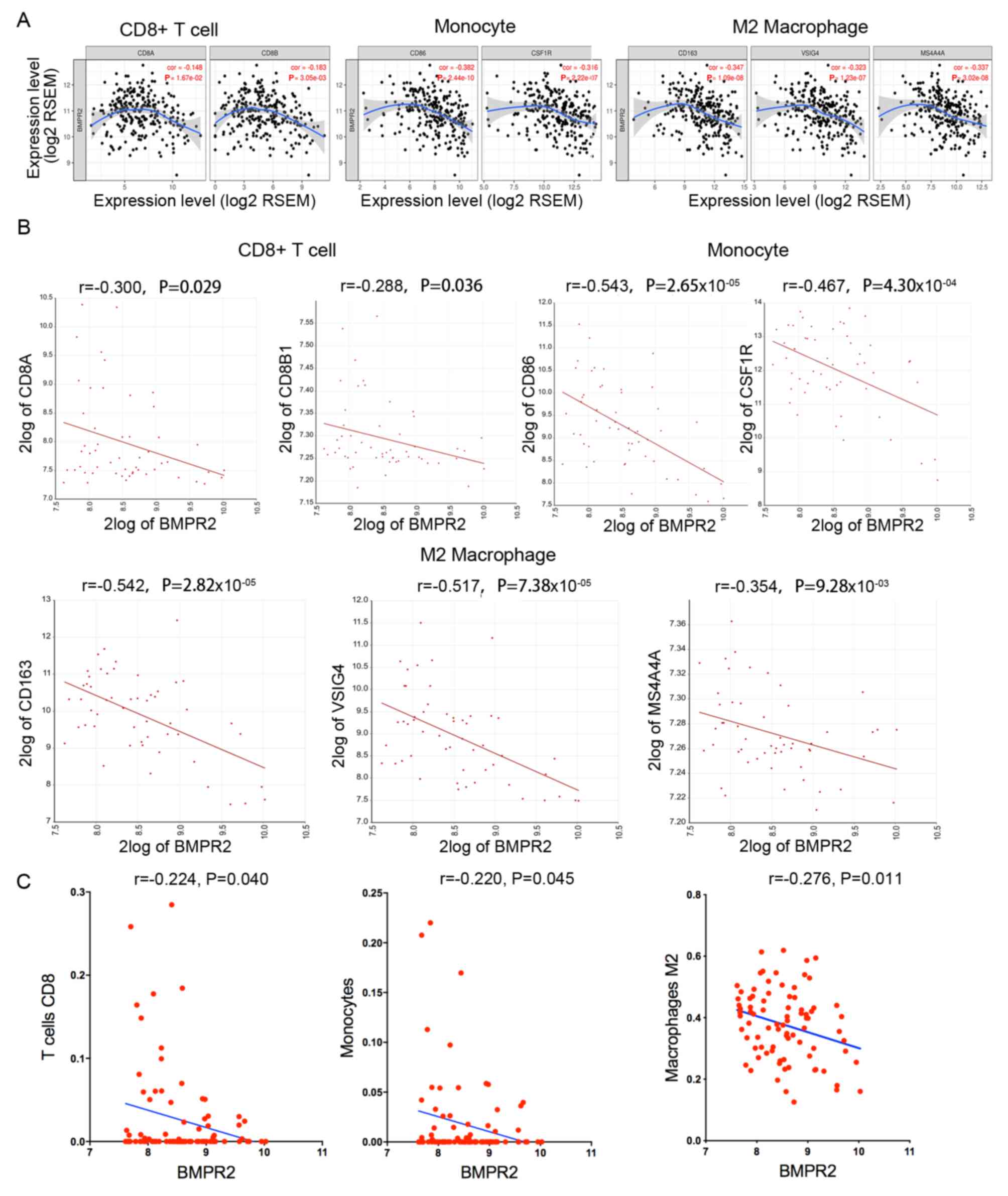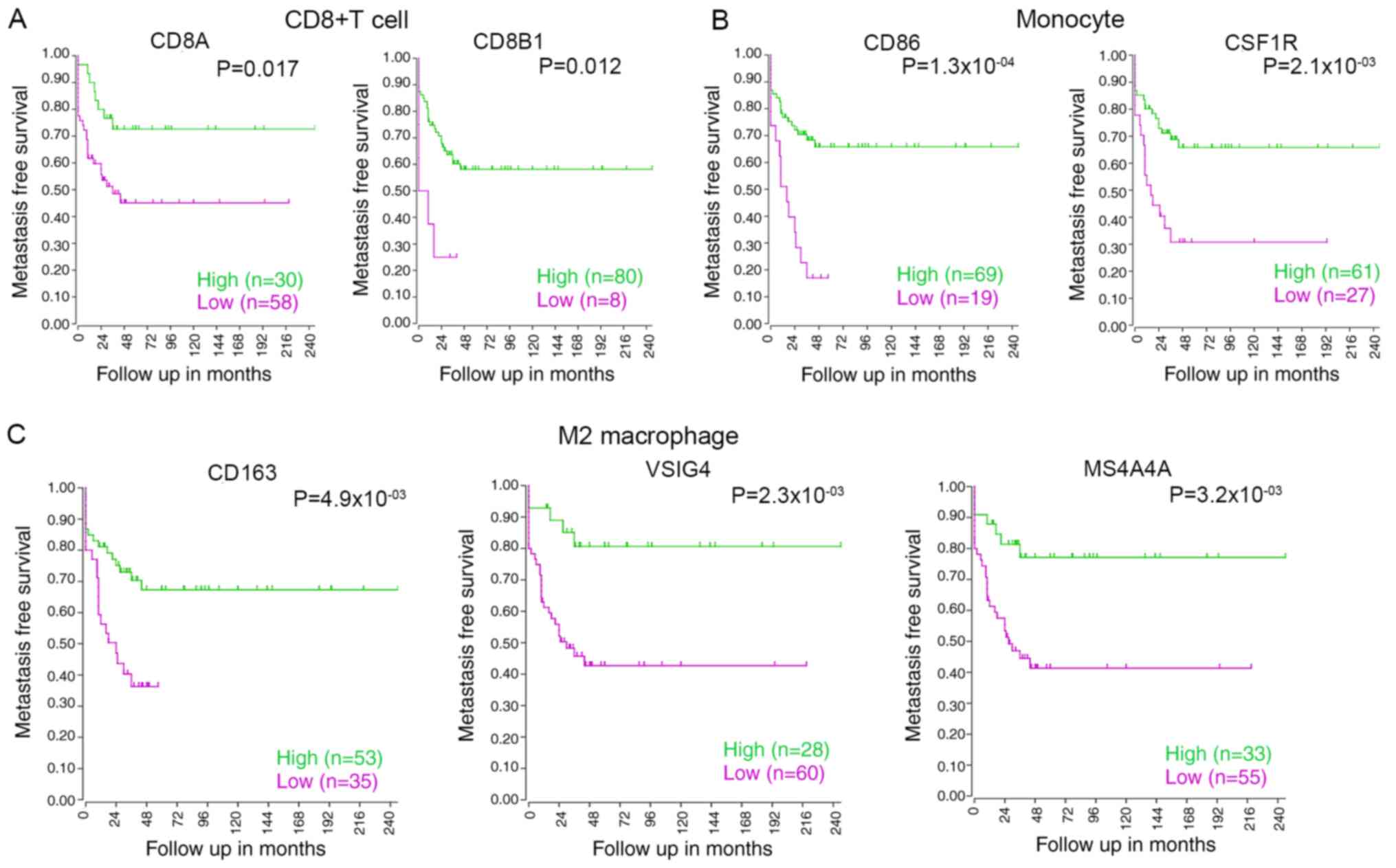|
1
|
Hameed M and Mandelker D: Tumor syndromes
predisposing to osteosarcoma. Adv Anat Pathol. 25:217–222. 2018.
View Article : Google Scholar : PubMed/NCBI
|
|
2
|
Otoukesh B, Boddouhi B, Moghtadaei M,
Kaghazian P and Kaghazian M: Novel molecular insights and new
therapeutic strategies in osteosarcoma. Cancer Cell Int.
18:1582018. View Article : Google Scholar : PubMed/NCBI
|
|
3
|
Harrison DJ, Geller DS, Gill JD, Lewis VO
and Gorlick R: Current and future therapeutic approaches for
osteosarcoma. Expert Rev Anticancer Ther. 18:39–50. 2018.
View Article : Google Scholar : PubMed/NCBI
|
|
4
|
Harting MT and Blakely ML: Management of
osteosarcoma pulmonary metastases. Semin Pediatr Surg. 15:25–29.
2006. View Article : Google Scholar : PubMed/NCBI
|
|
5
|
Carrle D and Bielack S: Osteosarcoma lung
metastases detection and principles of multimodal therapy. Cancer
Treat Res. 152:165–184. 2009. View Article : Google Scholar : PubMed/NCBI
|
|
6
|
Link MP, Goorin AM, Miser AW, Green AA,
Pratt CB, Belasco JB, Pritchard J, Malpas JS, Baker AR, Kirkpatrick
JA, et al: The effect of adjuvant chemotherapy on relapse-free
survival in patients with osteosarcoma of the extremity. N Engl J
Med. 314:1600–1606. 1986. View Article : Google Scholar : PubMed/NCBI
|
|
7
|
Meyers PA, Healey JH, Chou AJ, Wexler LH,
Merola PR, Morris CD, Laquaglia MP, Kellick MG, Abramson SJ and
Gorlick R: Addition of pamidronate to chemotherapy for the
treatment of osteosarcoma. Cancer. 117:2011. View Article : Google Scholar
|
|
8
|
Mirabello L, Troisi RJ and Savage SA:
Osteosarcoma incidence and survival rates from 1973 to 2004: Data
from the surveillance, Epidemiology, and end results program.
Cancer. 115:1531–1543. 2009. View Article : Google Scholar : PubMed/NCBI
|
|
9
|
Locy H, de Mey S, de Mey W, De Ridder M,
Thielemans K and Maenhout SK: Maenhout, Immunomodulation of the
tumor microenvironment: Turn Foe into friend. Front Immunol.
9:29092018. View Article : Google Scholar : PubMed/NCBI
|
|
10
|
Dumauthioz N, Labiano S and Romero P:
Tumor resident memory T cells: New players in immune surveillance
and therapy. Front Immunol. 9:20762018. View Article : Google Scholar : PubMed/NCBI
|
|
11
|
Blanc C, Hans S, Tran T, Granier C,
Saldman A, Anson M, Oudard S and Tartour E: Targeting resident
memory T cells for cancer immunotherapy. Front Immunol. 9:17222018.
View Article : Google Scholar : PubMed/NCBI
|
|
12
|
Gajewski TF, Schreiber H and Fu YX: Innate
and adaptive immune cells in the tumor microenvironment. Nat
Immunol. 14:1014–1022. 2013. View
Article : Google Scholar : PubMed/NCBI
|
|
13
|
Grivennikov SI, Greten FR and Karin M:
Immunity, inflammation, and cancer. Cell. 140:883–899. 2010.
View Article : Google Scholar : PubMed/NCBI
|
|
14
|
Schreiber RD, Old LJ and Smyth MJ: Cancer
immunoediting: Integrating immunity's roles in cancer suppression
and promotion. Science. 331:1565–1570. 2011. View Article : Google Scholar : PubMed/NCBI
|
|
15
|
Lussier DM, O'Neill L, Nieves LM, McAfee
MS, Holechek SA, Collins AW, Dickman P, Jacobsen J, Hingorani P and
Blattman JN: Enhanced T-cell immunity to osteosarcoma through
antibody blockade of PD-1/PD-L1 interactions. J Immunother.
38:96–106. 2015. View Article : Google Scholar : PubMed/NCBI
|
|
16
|
Shen JK, Cote GM, Choy E, Yang P, Harmon
D, Schwab J, Nielsen GP, Chebib I, Ferrone S, Wang X, et al:
Programmed cell death ligand 1 expression in osteosarcoma. Cancer
Immunol Res. 2:690–698. 2014. View Article : Google Scholar : PubMed/NCBI
|
|
17
|
Beppu H, Mwizerwa ON, Beppu Y, Dattwyler
MP, Lauwers GY, Bloch KD and Goldstein AM: Stromal inactivation of
BMPRII leads to colorectal epithelial overgrowth and polyp
formation. Oncogene. 27:1063–1070. 2008. View Article : Google Scholar : PubMed/NCBI
|
|
18
|
Kim IY, Lee DH, Lee DK, Kim WJ, Kim MM,
Morton RA, Lerner SP and Kim SJ: Restoration of bone morphogenetic
protein receptor type II expression leads to a decreased rate of
tumor growth in bladder transitional cell carcinoma cell line
TSU-Pr1. Cancer Res. 64:7355–7360. 2004. View Article : Google Scholar : PubMed/NCBI
|
|
19
|
Voorneveld PW, Kodach LL, Jacobs RJ, Liv
N, Zonnevylle AC, Hoogenboom JP, Biemond I, Verspaget HW, Hommes
DW, de Rooij K, et al: Loss of SMAD4 alters BMP signaling to
promote colorectal cancer cell metastasis via activation of Rho and
ROCK. Gastroenterology. 147:196–208 e113. 2014. View Article : Google Scholar : PubMed/NCBI
|
|
20
|
Wang S, Ren T, Huang Y, Bao X, Sun K, Shen
D and Guo W: BMPR2 and HIF1-α overexpression in resected
osteosarcoma correlates with distant metastasis and patient
survival. Chin J Cancer Res. 29:447–454. 2017. View Article : Google Scholar : PubMed/NCBI
|
|
21
|
Martínez VG, Rubio C, Martínez-Fernández
M, Segovia C, López-Calderón F, Garín MI, Teijeira A,
Munera-Maravilla E, Varas A, Sacedón R, et al: BMP4 induces M2
macrophage polarization and favors tumor progression in bladder
cancer. Clin Cancer Res. 23:7388–7399. 2017. View Article : Google Scholar : PubMed/NCBI
|
|
22
|
Rhodes DR, Kalyana-Sundaram S, Mahavisno
V, Varambally R, Yu J, Briggs BB, Barrette TR, Anstet MJ,
Kincead-Beal C, Kulkarni P, et al: Oncomine 3.0: Genes, pathways,
and networks in a collection of 18,000 cancer gene expression
profiles. Neoplasia. 9:166–180. 2007. View Article : Google Scholar : PubMed/NCBI
|
|
23
|
Jones KB, Salah Z, Del Mare S, Galasso M,
Gaudio E, Nuovo GJ, Lovat F, LeBlanc K, Palatini J, Randall RL, et
al: miRNA signatures associate with pathogenesis and progression of
osteosarcoma. Cancer Res. 72:1865–1877. 2012. View Article : Google Scholar : PubMed/NCBI
|
|
24
|
Kuijjer ML, Rydbeck H, Kresse SH, Buddingh
EP, Lid AB, Roelofs H, Bürger H, Myklebost O, Hogendoorn PC,
Meza-Zepeda LA and Cleton-Jansen AM: Identification of osteosarcoma
driver genes by integrative analysis of copy number and gene
expression data. Genes Chromosomes Cancer. 51:696–706. 2012.
View Article : Google Scholar : PubMed/NCBI
|
|
25
|
Kobayashi E, Masuda M, Nakayama R,
Ichikawa H, Satow R, Shitashige M, Honda K, Yamaguchi U, Shoji A,
Tochigi N, et al: Reduced argininosuccinate synthetase is a
predictive biomarker for the development of pulmonary metastasis in
patients with osteosarcoma. Mol Cancer Ther. 9:535–544. 2010.
View Article : Google Scholar : PubMed/NCBI
|
|
26
|
Schafer W: Rhabdomyosarcoma vs normal
muscle. R2 database. 2000-01-01 ed., 2000. p. Available on R2
since: 2000-01-01.
|
|
27
|
Huvos AG, Rosen G and Marcove RC: Primary
osteogenic sarcoma: Pathologic aspects in 20 patients after
treatment with chemotherapy en bloc resection, and prosthetic bone
replacement. Arch Pathol Lab Med. 101:14–18. 1977.PubMed/NCBI
|
|
28
|
Li T, Fan J, Wang B, Traugh N, Chen Q, Liu
JS, Li B and Liu XS: TIMER: A web server for comprehensive analysis
of tumor-infiltrating immune cells. Cancer Res. 77:e108–e110. 2017.
View Article : Google Scholar : PubMed/NCBI
|
|
29
|
Siemers NO, Holloway JL, Chang H, Chasalow
SD, Ross-MacDonald PB, Voliva CF and Szustakowski JD: Genome-wide
association analysis identifies genetic correlates of immune
infiltrates in solid tumors. PLoS One. 12:e01797262017. View Article : Google Scholar : PubMed/NCBI
|
|
30
|
Danaher P, Warren S, Dennis L, D'Amico L,
White A, Disis ML, Geller MA, Odunsi K, Beechem J and Fling SP:
Gene expression markers of tumor Infiltrating leukocytes. J
Immunother Cancer. 5:182017. View Article : Google Scholar : PubMed/NCBI
|
|
31
|
Sousa S and Maatta J: The role of
tumour-associated macrophages in bone metastasis. J Bone Oncol.
5:135–138. 2016. View Article : Google Scholar : PubMed/NCBI
|
|
32
|
Gentles AJ, Newman AM, Liu CL, Bratman SV,
Feng W, Kim D, Nair VS, Xu Y, Khuong A, Hoang CD, et al: The
prognostic landscape of genes and infiltrating immune cells across
human cancers. Nat Med. 21:938–945. 2015. View Article : Google Scholar : PubMed/NCBI
|
|
33
|
Subramanian A, Tamayo P, Mootha VK,
Mukherjee S, Ebert BL, Gillette MA, Paulovich A, Pomeroy SL, Golub
TR, Lander ES and Mesirov JP: Gene set enrichment analysis: A
knowledge-based approach for interpreting genome-wide expression
profiles. Proc Natl Acad Sci USA. 102:15545–15550. 2005. View Article : Google Scholar : PubMed/NCBI
|
|
34
|
R Core Team, . R: A language and
environment for statistical computing. R Foundation for Statistical
Computing; Vienna, Austria: 2012, ISBN 3-900051-07-0, URL.
http://www.R-project.org/
|
|
35
|
Binnewies M, Roberts EW, Kersten K, Chan
V, Fearon DF, Merad M, Coussens LM, Gabrilovich DI,
Ostrand-Rosenberg S, Hedrick CC, et al: Understanding the tumor
immune microenvironment (TIME) for effective therapy. Nat Med.
24:541–550. 2018. View Article : Google Scholar : PubMed/NCBI
|
|
36
|
Bami M, Mavrogenis AF, Angelini A,
Milonaki M, Mitsiokapa E, Stamoulis D and Soucacos PN: Bone
morphogenetic protein signaling in musculoskeletal cancer. J Cancer
Res Clin Oncol. 142:2061–2072. 2016. View Article : Google Scholar : PubMed/NCBI
|
|
37
|
Siegel PM and Massague J: Cytostatic and
apoptotic actions of TGF-beta in homeostasis and cancer. Nat Rev
Cancer. 3:807–821. 2003. View Article : Google Scholar : PubMed/NCBI
|
|
38
|
Kim IY, Lee DH, Lee DK, Ahn HJ, Kim MM,
Kim S and Morton RA: Morton: Loss of expression of bone
morphogenetic protein receptor type II in human prostate cancer
cells. Oncogene. 23:7651–7659. 2004. View Article : Google Scholar : PubMed/NCBI
|
|
39
|
Heymann MF, Lézot F and Heymann D: The
contribution of immune infiltrates and the local microenvironment
in the pathogenesis of osteosarcoma. Cell Immunol. 343:1037112019.
View Article : Google Scholar : PubMed/NCBI
|
|
40
|
Apetoh L, Smyth MJ, Drake CG, Abastado JP,
Apte RN, Ayyoub M, Blay JY, Bonneville M, Butterfield LH, Caignard
A, et al: Consensus nomenclature for CD8(+) T cell phenotypes in
cancer. Oncoimmunology. 4:e9985382015. View Article : Google Scholar : PubMed/NCBI
|
|
41
|
Speiser DE, Utzschneider DT, Oberle SG,
Münz C, Romero P and Zehn D: T cell differentiation in chronic
infection and cancer: Functional adaptation or exhaustion? Nat Rev
Immunol. 14:768–774. 2014. View Article : Google Scholar : PubMed/NCBI
|
|
42
|
Mittal R, Chen CW, Lyons JD, Margoles LM,
Liang Z, Coopersmith CM and Ford ML: Murine lung cancer induces
generalized T-cell exhaustion. J Surg Res. 195:541–549. 2015.
View Article : Google Scholar : PubMed/NCBI
|
|
43
|
Baitsch L, Baumgaertner P, Devêvre E,
Raghav SK, Legat A, Barba L, Wieckowski S, Bouzourene H, Deplancke
B, Romero P, et al: Exhaustion of tumor-specific CD8(+) T cells in
metastases from melanoma patients. J Clin Invest. 121:2350–2360.
2011. View Article : Google Scholar : PubMed/NCBI
|
|
44
|
Japp AS, Kursunel MA, Meier S, Mälzer JN,
Li X, Rahman NA, Jekabsons W, Krause H, Magheli A, Klopf C, et al:
Dysfunction of PSA-specific CD8+ T cells in prostate cancer
patients correlates with CD38 and Tim-3 expression. Cancer Immunol
Immunother. 64:1487–1494. 2015. View Article : Google Scholar : PubMed/NCBI
|
|
45
|
Zheng W, Xiao H, Liu H and Zhou Y:
Expression of programmed death 1 is correlated with progression of
osteosarcoma. APMIS. 123:102–107. 2015. View Article : Google Scholar : PubMed/NCBI
|
|
46
|
Fritzsching B, Fellenberg J, Moskovszky L,
Sápi Z, Krenacs T, Machado I, Poeschl J, Lehner B, Szendrõi M,
Bosch AL, et al: CD8+/FOXP3+-ratio in
osteosarcoma microenvironment separates survivors from
non-survivors: A multicenter validated retrospective study.
Oncoimmunology. 4:e9908002015. View Article : Google Scholar : PubMed/NCBI
|
|
47
|
Qian BZ and Pollard JW: Macrophage
diversity enhances tumor progression and metastasis. Cell.
141:39–51. 2010. View Article : Google Scholar : PubMed/NCBI
|
|
48
|
Dumars C, Ngyuen JM, Gaultier A, Lanel R,
Corradini N, Gouin F, Heymann D and Heymann MF: Dysregulation of
macrophage polarization is associated with the metastatic process
in osteosarcoma. Oncotarget. 7:78343–78354. 2016. View Article : Google Scholar : PubMed/NCBI
|
|
49
|
Zhang C, Zheng JH, Lin ZH, Lv HY, Ye ZM,
Chen YP and Zhang XY: Profiles of immune cell infiltration and
immune-related genes in the tumor microenvironment of osteosarcoma.
Aging (Albany NY). 12:3486–3501. 2020. View Article : Google Scholar : PubMed/NCBI
|
|
50
|
Eixarch H, Calvo-Barreiro L, Montalban X
and Espejo C: Bone morphogenetic proteins in multiple sclerosis:
Role in neuroinflammation. Brain Behav Immun. 68:1–10. 2018.
View Article : Google Scholar : PubMed/NCBI
|
|
51
|
Singla DK, Singla R and Wang J: BMP-7
treatment increases M2 macrophage differentiation and reduces
inflammation and plaque formation in Apo E-/- mice. PLoS One.
11:e01478972016. View Article : Google Scholar : PubMed/NCBI
|
|
52
|
Limmer A and Wirtz DC: Osteoimmunology:
Influence of the immune system on bone regeneration and
consumption. Z Orthop Unfall. 155:273–280. 2017. View Article : Google Scholar : PubMed/NCBI
|
|
53
|
Kuczma M, Kurczewska A and Kraj P:
Modulation of bone morphogenic protein signaling in T-cells for
cancer immunotherapy. J Immunotoxicol. 11:319–327. 2014. View Article : Google Scholar : PubMed/NCBI
|
|
54
|
Browning LM, Pietrzak M, Kuczma M, Simms
CP, Kurczewska A, Refugia JM, Lowery DJ, Rempala G, Gutkin D,
Ignatowicz L, et al: TGF-β-mediated enhancement of TH17
cell generation is inhibited by bone morphogenetic protein receptor
1α signaling. Sci Signal. 11:eaar21252018. View Article : Google Scholar : PubMed/NCBI
|
|
55
|
Huse K, Bakkebø M, Oksvold MP, Forfang L,
Hilden VI, Stokke T, Smeland EB and Myklebust JH: Bone
morphogenetic proteins inhibit CD40L/IL-21-induced Ig production in
human B cells: Differential effects of BMP-6 and BMP-7. Eur J
Immunol. 41:3135–3145. 2011. View Article : Google Scholar : PubMed/NCBI
|
|
56
|
Gámez B, Rodriguez-Carballo E and Ventura
F: BMP signaling in telencephalic neural cell specification and
maturation. Front Cell Neurosci. 7:872013. View Article : Google Scholar : PubMed/NCBI
|
|
57
|
Kumar S, Boehm J and Lee JC: p38 MAP
kinases: Key signalling molecules as therapeutic targets for
inflammatory diseases. Nat Rev Drug Discov. 2:717–726. 2003.
View Article : Google Scholar : PubMed/NCBI
|
|
58
|
Liang X, Wang L, Wang M, Liu Z, Liu X,
Zhang B, Liu E and Li G: MicroRNA-124 inhibits macrophage cell
apoptosis via targeting p38/MAPK signaling pathway in
atherosclerosis development. Aging (Albany NY). 12:13005–13022.
2020. View Article : Google Scholar : PubMed/NCBI
|
|
59
|
Zhang Y, Velez-Delgado A, Mathew E, Li D,
Mendez FM, Flannagan K, Rhim AD, Simeone DM, Beatty GL and Pasca di
Magliano M: Myeloid cells are required for PD-1/PD-L1 checkpoint
activation and the establishment of an immunosuppressive
environment in pancreatic cancer. Gut. 66:124–136. 2017. View Article : Google Scholar : PubMed/NCBI
|
|
60
|
Wu M, Chen X, Lou J, Zhang S, Zhang X,
Huang L, Sun R, Huang P, Wang F and Pan S: TGF-β1 contributes to
CD8+ Treg induction through p38 MAPK signaling in ovarian cancer
microenvironment. Oncotarget. 7:44534–44544. 2016. View Article : Google Scholar : PubMed/NCBI
|
|
61
|
Liao P, Song K, Zhu Z, Liu Z, Zhang W, Li
W, Hu J, Hu Q, Chen C, Chen B, et al: Propranolol suppresses the
growth of colorectal cancer through simultaneously activating
autologous CD8(+) T cells and inhibiting tumor AKT/MAPK pathway.
Clin Pharmacol Ther. 108:606–615. 2020. View Article : Google Scholar : PubMed/NCBI
|
|
62
|
Ngan HL, Liu Y, Fong AY, Poon PHY, Yeung
CK, Chan SSM, Lau A, Piao W, Li H, Tse JSW, et al: MAPK pathway
mutations in head and neck cancer affect immune microenvironments
and ErbB3 signaling. Life Sci Alliance. 3:e2019005452020.
View Article : Google Scholar : PubMed/NCBI
|
|
63
|
Pousada G, Baloira A and Valverde D:
Methylation analysis of the BMPR2 gene promoter region in patients
with pulmonary arterial hypertension. Arch Bronconeumol.
52:293–298. 2016.(In English, Spanish). View Article : Google Scholar : PubMed/NCBI
|
|
64
|
Liu D, Yan Y, Chen JW, Yuan P, Wang XJ,
Jiang R, Wang L, Zhao QH, Wu WH, Simonneau G, et al:
Hypermethylation of BMPR2 promoter occurs in patients with
heritable pulmonary arterial hypertension and inhibits BMPR2
expression. Am J Respir Crit Care Med. 196:925–928. 2017.
View Article : Google Scholar : PubMed/NCBI
|
|
65
|
Gräf S, Haimel M, Bleda M, Hadinnapola C,
Southgate L, Li W, Hodgson J, Liu B, Salmon RM, Southwood M, et al:
Identification of rare sequence variation underlying heritable
pulmonary arterial hypertension. Nat Commun. 9:14162018. View Article : Google Scholar : PubMed/NCBI
|
|
66
|
Zhu N, Pauciulo MW, Welch CL, Lutz KA,
Coleman AW, Gonzaga-Jauregui C, Wang J, Grimes JM, Martin LJ, He H,
et al: Novel risk genes and mechanisms implicated by exome
sequencing of 2572 individuals with pulmonary arterial
hypertension. Genome Med. 11:692019. View Article : Google Scholar : PubMed/NCBI
|
|
67
|
Kodach LL, Wiercinska E, de Miranda NF,
Bleuming SA, Musler AR, Peppelenbosch MP, Dekker E, van den Brink
GR, van Noesel CJ, Morreau H, et al: The bone morphogenetic protein
pathway is inactivated in the majority of sporadic colorectal
cancers. Gastroenterology. 134:1332–1341. 2008. View Article : Google Scholar : PubMed/NCBI
|
|
68
|
Shi J, Jiang D, Yang S, Sun Y, Wang J,
Zhang X, Liu Y, Lu Y and Yang K: Molecular profile reveals
immune-associated markers of lymphatic invasion in human colon
adenocarcinoma. Int Immunopharmacol. 83:1064022020. View Article : Google Scholar : PubMed/NCBI
|
|
69
|
Wang S, Ren T, Jiao G, Huang Y, Bao X,
Zhang F, Liu K, Zheng B, Sun K and Guo W: BMPR2 promotes invasion
and metastasis via the RhoA-ROCK-LIMK2 pathway in human
osteosarcoma cells. Oncotarget. 8:58625–58641. 2017. View Article : Google Scholar : PubMed/NCBI
|
|
70
|
Sun L, Hui AM, Su Q, Vortmeyer A,
Kotliarov Y, Pastorino S, Passaniti A, Menon J, Walling J, Bailey
R, et al: Neuronal and glioma-derived stem cell factor induces
angiogenesis within the brain. Cancer Cell. 9:287–300. 2006.
View Article : Google Scholar : PubMed/NCBI
|
|
71
|
Turashvili G, Bouchal J, Baumforth K, Wei
W, Dziechciarkova M, Ehrmann J, Klein J, Fridman E, Skarda J,
Srovnal J, et al: Novel markers for differentiation of lobular and
ductal invasive breast carcinomas by laser microdissection and
microarray analysis. BMC Cancer. 7:552007. View Article : Google Scholar : PubMed/NCBI
|
|
72
|
Kaiser S, Park YK, Franklin JL, Halberg
RB, Yu M, Jessen WJ, Freudenberg J, Chen X, Haigis K, Jegga AG, et
al: Transcriptional recapitulation and subversion of embryonic
colon development by mouse colon tumor models and human colon
cancer. Genome Biol. 8:R1312007. View Article : Google Scholar : PubMed/NCBI
|
|
73
|
Hao Y, Triadafilopoulos G, Sahbaie P,
Young HS, Omary MB and Lowe AW: Gene expression profiling reveals
stromal genes expressed in common between Barrett's esophagus and
adenocarcinoma. Gastroenterology. 131:925–933. 2006. View Article : Google Scholar : PubMed/NCBI
|
|
74
|
Pyeon D, Newton MA, Lambert PF, den Boon
JA, Sengupta S, Marsit CJ, Woodworth CD, Connor JP, Haugen TH,
Smith EM, et al: Fundamental differences in cell cycle deregulation
in human papillomavirus-positive and human papillomavirus-negative
head/neck and cervical cancers. Cancer Res. 67:4605–4619. 2007.
View Article : Google Scholar : PubMed/NCBI
|
|
75
|
Cutcliffe C, Kersey D, Huang CC, Zeng Y,
Walterhouse D and Perlman EJ; Renal Tumor Committee of the
Children's Oncology Group, : Clear cell sarcoma of the kidney:
Up-regulation of neural markers with activation of the sonic
hedgehog and Akt pathways. Clin Cancer Res. 11:7986–7994. 2005.
View Article : Google Scholar : PubMed/NCBI
|
|
76
|
Yusenko MV, Kuiper RP, Boethe T, Ljungberg
B, van Kessel AG and Kovacs G: High-resolution DNA copy number and
gene expression analyses distinguish chromophobe renal cell
carcinomas and renal oncocytomas. BMC Cancer. 9:1522009. View Article : Google Scholar : PubMed/NCBI
|
|
77
|
Alizadeh AA, Eisen MB, Davis RE, Ma C,
Lossos IS, Rosenwald A, Boldrick JC, Sabet H, Tran T, Yu X, et al:
Distinct types of diffuse large B-cell lymphoma identified by gene
expression profiling. Nature. 403:503–511. 2000. View Article : Google Scholar : PubMed/NCBI
|
|
78
|
Rosenwald A, Alizadeh AA, Widhopf G, Simon
R, Davis RE, Yu X, Yang L, Pickeral OK, Rassenti LZ, Powell J, et
al: Relation of gene expression phenotype to immunoglobulin
mutation genotype in B cell chronic lymphocytic leukemia. J Exp
Med. 194:1639–1647. 2001. View Article : Google Scholar : PubMed/NCBI
|
|
79
|
Haferlach T, Kohlmann A, Wieczorek L,
Basso G, Kronnie GT, Béné MC, De Vos J, Hernández JM, Hofmann WK,
Mills KI, et al: Clinical utility of microarray-based gene
expression profiling in the diagnosis and subclassification of
leukemia: Report from the International Microarray Innovations in
Leukemia Study Group. J Clin Oncol. 28:2529–2537. 2010. View Article : Google Scholar : PubMed/NCBI
|
|
80
|
Rosenwald A, Wright G, Chan WC, Connors
JM, Campo E, Fisher RI, Gascoyne RD, Muller-Hermelink HK, Smeland
EB, Giltnane JM, et al: The use of molecular profiling to predict
survival after chemotherapy for diffuse large-B-cell lymphoma. N
Engl J Med. 346:1937–1947. 2002. View Article : Google Scholar : PubMed/NCBI
|
|
81
|
Basso K, Margolin AA, Stolovitzky G, Klein
U, Dalla-Favera R and Califano A: Reverse engineering of regulatory
networks in human B cells. Nat Genet. 37:382–390. 2005. View Article : Google Scholar : PubMed/NCBI
|
|
82
|
Dürig J, Bug S, Klein-Hitpass L, Boes T,
Jöns T, Martin-Subero JI, Harder L, Baudis M, Dührsen U and Siebert
R: Combined single nucleotide polymorphism-based genomic mapping
and global gene expression profiling identifies novel chromosomal
imbalances, mechanisms and candidate genes important in the
pathogenesis of T-cell prolymphocytic leukemia with
inv(14)(q11q32). Leukemia. 21:2153–2163. 2007. View Article : Google Scholar : PubMed/NCBI
|
|
83
|
Hou J, Aerts J, den Hamer B, van Ijcken W,
den Bakker M, Riegman P, van der Leest C, van der Spek P, Foekens
JA, Hoogsteden HC, et al: Gene expression-based classification of
non-small cell lung carcinomas and survival prediction. PLoS One.
5:e103122010. View Article : Google Scholar : PubMed/NCBI
|
|
84
|
Compagno M, Lim WK, Grunn A, Nandula SV,
Brahmachary M, Shen Q, Bertoni F, Ponzoni M, Scandurra M, Califano
A, et al: Mutations of multiple genes cause deregulation of
NF-kappaB in diffuse large B-cell lymphoma. Nature. 459:717–721.
2009. View Article : Google Scholar : PubMed/NCBI
|
|
85
|
Haqq C, Nosrati M, Sudilovsky D, Crothers
J, Khodabakhsh D, Pulliam BL, Federman S, Miller JR III, Allen RE,
Singer MI, et al: The gene expression signatures of melanoma
progression. Proc Natl Acad Sci USA. 102:6092–6097. 2005.
View Article : Google Scholar : PubMed/NCBI
|
|
86
|
Badea L, Herlea V, Dima SO, Dumitrascu T
and Popescu I: Combined gene expression analysis of whole-tissue
and microdissected pancreatic ductal adenocarcinoma identifies
genes specifically overexpressed in tumor epithelia.
Hepatogastroenterology. 55:2016–2027. 2008.PubMed/NCBI
|
|
87
|
Iacobuzio-Donahue CA, Maitra A, Olsen M,
Lowe AW, van Heek NT, Rosty C, Walter K, Sato N, Parker A, Ashfaq
R, et al: Exploration of global gene expression patterns in
pancreatic adenocarcinoma using cDNA microarrays. Am J Pathol.
162:1151–1162. 2003. View Article : Google Scholar : PubMed/NCBI
|
|
88
|
Luo JH, Yu YP, Cieply K, Lin F, Deflavia
P, Dhir R, Finkelstein S, Michalopoulos G and Becich M: Gene
expression analysis of prostate cancers. Mol Carcinog. 33:25–35.
2002. View Article : Google Scholar : PubMed/NCBI
|
|
89
|
Cho JY, Lim JY, Cheong JH, Park YY, Yoon
SL, Kim SM, Kim SB, Kim H, Hong SW, Park YN, et al: Gene expression
signature-based prognostic risk score in gastric cancer. Clin
Cancer Res. 17:1850–1857. 2011. View Article : Google Scholar : PubMed/NCBI
|
|
90
|
Riker AI, Enkemann SA, Fodstad O, Liu S,
Ren S, Morris C, Xi Y, Howell P, Metge B, Samant RS, et al: The
gene expression profiles of primary and metastatic melanoma yields
a transition point of tumor progression and metastasis. BMC Med
Genomics. 1:132008. View Article : Google Scholar : PubMed/NCBI
|
|
91
|
Korkola JE, Houldsworth J, Chadalavada RS,
Olshen AB, Dobrzynski D, Reuter VE, Bosl GJ and Chaganti RS:
Down-regulation of stem cell genes, including those in a 200-kb
gene cluster at 12p13.31, is associated with in vivo
differentiation of human male germ cell tumors. Cancer Res.
66:820–827. 2006. View Article : Google Scholar : PubMed/NCBI
|















